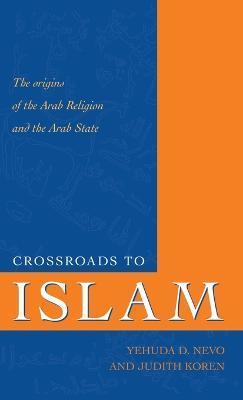Crossroads to Islam: The Origins of the Arab Religion and the Arab State

Crossroads to Islam: The Origins of the Arab Religion and the Arab State
In this controversial exploration of the early history of Islam, archaeologist Yehuda D. Nevo and researcher Judith Koren present a revolutionary theory of the origins and development of the Islamic state and religion. Whereas most works on this subject derive their view of the history of this period from the Muslim literature, Crossroads to Islam also examines important types of evidence hitherto neglected: the literature of the local (Christian) population, archaeological excavations, numismatics, and especially rock inscriptions. These analyses lay the foundation for a radical view of the development of Islam. According to Nevo and Koren, the evidence suggests that the Arabs were in fact pagan when they assumed power in the regions formerly ruled by the Byzantine Empire. They contend that the Arabs took control almost without a struggle, because Byzantium had effectively withdrawn from the area long before. After establishing control, the new Arab elite adopted a simple monotheism influenced by Judaeo-Christianity, which they encountered in their newly acquired territories, and gradually developed it into the Arab religion. Not until the mid-8th century was this process completed. This interpretation of the evidence corroborates the view of other scholars, who on different grounds propose that Islam and the canonized version of the Koran were preceded by a long period of development. This new view turns on its head the traditional history of the rise of Islam, which claims that Islam began with Muhammad in Mecca and Medina around 622; then spread throughout Arabia under his charismatic leadership; and finally, after Muhammad's death (632), inspired his followers to conquer widespread territories both in the East and West. By contrast, Nevo and Koren suggest that the rise of the Arab state created a need for a state religion, eventually called Islam. This absorbing and controversial rethinking of Islam's early history is must reading for students and scholars of Islamic history and anyone interested in the origins of the world's second largest religion.
PRP: 232.50 Lei
Acesta este Prețul Recomandat de Producător. Prețul de vânzare al produsului este afișat mai jos.
186.00Lei
186.00Lei
232.50 LeiLivrare in 2-4 saptamani
Descrierea produsului
In this controversial exploration of the early history of Islam, archaeologist Yehuda D. Nevo and researcher Judith Koren present a revolutionary theory of the origins and development of the Islamic state and religion. Whereas most works on this subject derive their view of the history of this period from the Muslim literature, Crossroads to Islam also examines important types of evidence hitherto neglected: the literature of the local (Christian) population, archaeological excavations, numismatics, and especially rock inscriptions. These analyses lay the foundation for a radical view of the development of Islam. According to Nevo and Koren, the evidence suggests that the Arabs were in fact pagan when they assumed power in the regions formerly ruled by the Byzantine Empire. They contend that the Arabs took control almost without a struggle, because Byzantium had effectively withdrawn from the area long before. After establishing control, the new Arab elite adopted a simple monotheism influenced by Judaeo-Christianity, which they encountered in their newly acquired territories, and gradually developed it into the Arab religion. Not until the mid-8th century was this process completed. This interpretation of the evidence corroborates the view of other scholars, who on different grounds propose that Islam and the canonized version of the Koran were preceded by a long period of development. This new view turns on its head the traditional history of the rise of Islam, which claims that Islam began with Muhammad in Mecca and Medina around 622; then spread throughout Arabia under his charismatic leadership; and finally, after Muhammad's death (632), inspired his followers to conquer widespread territories both in the East and West. By contrast, Nevo and Koren suggest that the rise of the Arab state created a need for a state religion, eventually called Islam. This absorbing and controversial rethinking of Islam's early history is must reading for students and scholars of Islamic history and anyone interested in the origins of the world's second largest religion.
Detaliile produsului









